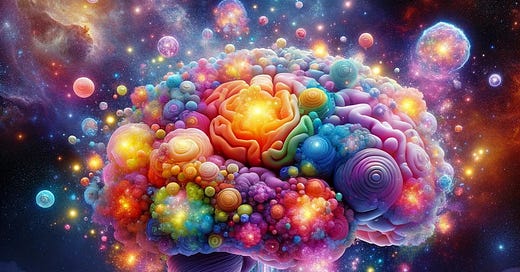"The Feeling of What Happens" is an interesting exploration of consciousness and the mind written by neuroscientist Antonio Damasio. In this book, Damasio delves into the intricate mechanisms that underlie our sense of self and our subjective experiences.
Through a blend of scientific research, philosophical reflection, and case studies, Damasio invites readers to embark on a journey into the depths of human consciousness. He challenges traditional views of the mind and proposes a new perspective that emphasizes the integral role of emotions and bodily sensations in shaping our thoughts and behaviors.
At the heart of Damasio's argument is the idea that our conscious experiences are inseparable from the physical and emotional processes that occur in our bodies. He argues that our sense of self arises from a complex interplay between the brain, the body, and the environment rather than being a purely intellectual or rational construct.
By examining phenomena such as emotions, memory, and the nature of consciousness itself, Damasio encourages readers to contemplate the fundamental question of what it means to be human. He suggests that our awareness of ourselves and the world around us is deeply rooted in our biological makeup and evolutionary history, shedding light on the mysteries of consciousness in a way that is both enlightening and accessible.
Damasio invites readers to consider the profound implications of his research for our understanding of the human mind and the nature of reality itself. "The Feeling of What Happens" is a captivating and thought-provoking exploration of consciousness that will leave readers with a deeper appreciation for the rich tapestry of experiences that make up our lives. Obviously, I highly recommend this book.
Consciousness
Consciousness is a complex, multifaceted phenomenon that has long captivated philosophers, scientists, and thinkers. It refers to the state of being aware of and able to perceive both internal and external stimuli, as well as having the capacity for subjective experiences, thoughts, and feelings.
In the realm of neuroscience, consciousness is often described as the awareness of one's existence and surroundings, accompanied by the ability to experience sensations, emotions, and thoughts. It involves the integration of information from various sensory modalities, memory systems, and cognitive processes to create a unified and coherent experience of the world.
One of the key questions surrounding consciousness is the so-called "hard problem, the challenge of understanding how physical processes in the brain give rise to subjective experiences and the sense of self. Neuroscientists and philosophers continue to grapple with the mystery of how neural activity and brain functions can generate the rich tapestry of conscious experiences that we encounter in our daily lives.
Some various theories and models attempt to explain consciousness, ranging from the idea of a global workspace in the brain where information is integrated and shared to theories that emphasize the role of neural oscillations and synchrony in creating conscious awareness. Some theories propose that consciousness emerges from complex interactions between different brain regions. In contrast, others suggest that it may involve quantum processes or even be a fundamental aspect of the universe itself.
Despite ongoing debates and challenges, the study of consciousness remains a vibrant and interdisciplinary field that holds great promise for unlocking the secrets of the mind. Understanding consciousness not only sheds light on human experience but also has implications for fields such as artificial intelligence, psychology, and philosophy. As researchers continue to explore the mysteries of consciousness, we may come closer to unraveling one of the most profound and enigmatic aspects of human existence.
Consciousness and Mind
Consciousness and mind are related concepts, but they are not the same. While they both pertain to aspects of human cognition and subjective experience, they refer to different facets of the complex workings of the human brain.
Consciousness typically refers to the state of being aware of one's existence and surroundings, as well as the capacity to perceive sensations, thoughts, and emotions. It is often described as the subjective experience of awareness and the ability to have a first-person perspective on the world. Consciousness involves the integration of sensory information, memories, and cognitive processes to create a unified and coherent experience of reality.
The mind is a broader concept that encompasses not only consciousness but also other mental processes such as perception, cognition, memory, emotions, and decision-making. It includes both conscious and unconscious mental activities and the complex network of neural processes that underlie our thoughts and behaviors.
While consciousness is a crucial aspect of the mind, it is just one component of the larger mental landscape. The mind encompasses a wide range of cognitive functions and processes that go beyond mere awareness, including reasoning, problem-solving, imagination, and self-reflection. The mind also includes subconscious processes that influence our behavior without our conscious awareness.
Spiritually
The relationship between the mind, brain, and spirituality is a complex and multifaceted topic that has intrigued philosophers, theologians, scientists, and spiritual seekers for centuries. Different perspectives exist on how these elements interact and influence each other within the context of spiritual beliefs and experiences.
From a scientific standpoint, the mind is often viewed as a product of the brain's complex neural activity and the physical processes that occur within it. Cognitive functions, emotions, memories, and consciousness are understood to arise from the interactions of neurons and neural networks in the brain. Many neuroscientists and researchers focus on understanding how the brain gives rise to mental phenomena, including subjective experiences and consciousness.
Spirituality often involves beliefs and practices that transcend the physical realm and emphasize the existence of a higher power, a universal consciousness, or a transcendent reality. Spiritual traditions and teachings may posit that the mind is more than just a product of brain activity and that it is connected to something greater or more profound than the physical world.
Some people who integrate spirituality and their beliefs into their understanding of the mind and brain may see the brain as a physical vessel that interacts with the mind, which may have a spiritual or metaphysical component. They may believe that spiritual experiences or insights can transcend the limitations of the physical brain and offer a deeper understanding of existence and consciousness.
Others may view the mind and brain as separate entities, with the mind existing beyond the physical body and having a spiritual essence or consciousness that is independent of neural processes. This perspective often aligns with beliefs in the existence of a soul or spiritual energy that transcends the physical body and brain.
Overall, the relationship between the mind, brain, and spirituality is a deeply personal and subjective matter that can differ depending on individual beliefs, experiences, and cultural backgrounds. While science offers insights into the physical mechanisms of the brain and mind, spirituality offers perspectives on consciousness, existence, and the interconnectedness of all things that may go beyond scientific explanation. Ultimately, how one integrates these different perspectives is a matter of personal interpretation and belief.
What is your opinion? I invite and encourage comments.








Derek, I can't imagine what that was like for you